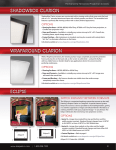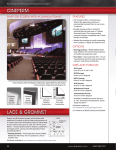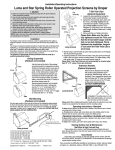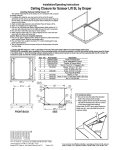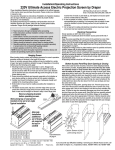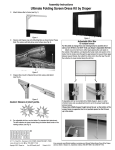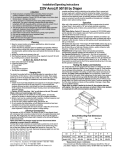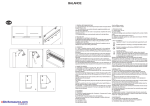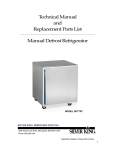Transcript
Installation Instructions Cineperm Permanently Tensioned Projection Screen by Draper ④ Attach frame to wall using appropriate fasteners for mounting surface (provided by others). NOTE: Measure screen frame width at the top, bottom, and center; Make sure the frame is installed so the center width is same as the width at the top and bottom. Drill through frame for mounting hardware. Enlarge first hole for screw head to pass through. Caution ① Read instructions through completely before proceeding. ② Follow instructions carefully. Installation contrary to instructions invalidates warranty. ③ Bent or warped frames will affect surface flatness and image quality. ④ Screen should be square, and width should not vary from the center to the ends of the frame ⑤ When lifting assembled screen, do not lift at only one corner; lift at both corners. Lifting by one corner could result in damage to the screen frame, especially on large screens. ⑥ Screen should be installed level (using a carpenter’s level). ⑦ Nothing should be fastened to screen frame or viewing surface. ⑧ Be careful not to rip screen material when attaching surface to frame. ⑨ The ideal temperature range for assembling this screen to prevent damaging the surface is 68°-78° F (20°-26° C). Assembling below recommended temperatures may damage surface and void warranty. NOTE: Screen has been inspected and tested at factory prior to shipment. Supporting structure Cineperm frame Frame Assembly Standard Frame— ① Lay out frame pieces on floor, by matching up color-coded tape near corners. Snaps should be facing up. ② Assemble frame (see Fig. 1). If necessary gently tap frame ends with a rubber mallet to make sure castings are fully seated. Truss Frame— ① Unfold and lay out pieces on floor, by matching up color coded marks. Lock all hinges (see Fig. 1). Stage Left and Stage Right sections should be placed with snaps up. Top and bottom sections should be placed with snaps down. ② To increase frame rigidity, hinges on top and bottom sections have rivnuts marked with red and green. Insert a Handy Crank through the threadless rivnut (red) and tighten into the threaded rivnut (green). ③ Apply small sections marked “Stiffener Bars” to back of bottom frame section, using 8 Handy Cranks. These eliminate sag on large suspended frames. Failure to use all Handy Cranks may result in screen frame damage. Turn bottom frame section over so snaps face up. ④ Repeat step 3 for top frame section. ⑤ Join top and bottom sections to Stage Left and Stage Right, using 2 Handy Cranks on each of the 4 corners. Match numbers on white labels. NOTE: No Handy Crank should protrude outside screen frame. ⑥ Attach surface (see “Surface Installation”), and suspend using appropriate materials (provided by others to meet specific installation requirements). Viewing surface snaps to Mounting hardware by others frame, covering mounting holes Figure 2 Inside (Jamb) Mount— ① Place frame assembly in opening to check for a snug fit. If frame is too large, opening may have to be enlarged. If frame is too small or does not sit square in the opening, shims and caulking may be required. ② Drill mounting holes in frame, and enlarge the first holes to allow screw heads to pass through (see Fig. 3). Do not allow screw heads to remain outside the frame: overtightening could bend frame and affect screen flatness. ③ Drill holes in jamb. ④ Attach frame using appropriate fasteners for mounting surface (provided by others). ⑤ Use caulk to ensure there is no light leakage around edges of frame. Cineperm frame Jamb of opening Drill through frame for mounting hardware. Enlarge first hole for screw head to pass through. Mounting hardware by others Viewing Surface snaps to frame, covering mounting holes Handy Cranks Color-coded tape Truss Style Frame Standard Frame Figure 3 Surface Installation Figure 1 Frame Installation (Standard Frame) ① Carefully remove surface from cardboard tube and unroll onto a clean cloth or paper. ② Engage snaps in each corner, then secure rest of screen snaps. ③ Stretch fabric across frame. Use extreme caution when attaching fabric. Overstretching or rough handling could cause the viewing surface to tear. Outside (Face) Mount— Outside (Face) Mount ① Drill mounting holes in frame (see Fig. 2). Wall ② Mark wall and drill holes to correspond with those in the frame. ③ Enlarge holes in frame side furthest from wall to allow screw heads to pass Anchor bolt by others. Clearance wall in outer through (see Fig. 2). Do not allow screw heads to remain outside the wall by others. Locate between snaps. frame: overtightening could bend frame and affect screen flatness. Snap-on viewing surface ® Always fold viewing surface with snaps face-to-face. Do not permit screen fabric to contact border material or snaps when folded. Store in pouch provided. Inside (Jamb) Mount 1 square alum. tube Wall Opening Anchor bolt by others. Clearance hole in outer wall by others. 1" square alum. tube Snap-on viewing surface Copyright © 2011 Draper Inc. Form Cineperm_Inst11 Printed in U.S.A. If you encounter any difficulties installing or servicing your Cineperm, call your dealer or Draper, Inc. in Spiceland, Indiana, 765-987-7999, or fax 765-987-7142.
